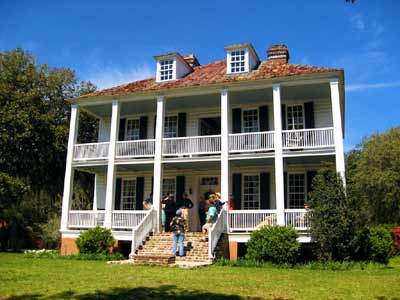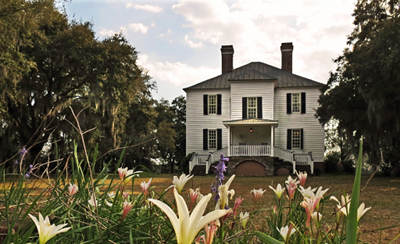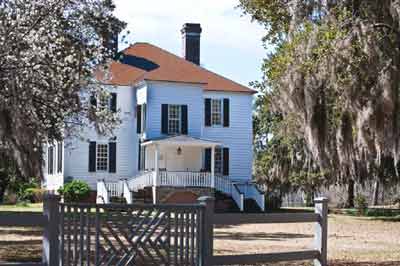Hopsewee Plantation – Georgetown – Georgetown County
Basic Information
- Location – North Santee River, Georgetown, Prince George Winyah Parish, Georgetown County
Located at 494 Hopsewee Road off US 17
- Origin of name – ?
- Other names – Hobsheewee, Hopsewee-on-the-Santee (1, p. 1)
- Current status – The land has been subdivided. The house is privately owned and open to the public
Timeline
- 1730s – Earliest known date of existence
- 1733-1740 – House built by Thomas Lynch Sr. (1, p. 6)
The house is a typical lowcountry rice plantation dwelling. Hopsewee is a preservation rather than restoration and it is very much the same as when first built (2).
- 1740s – Thomas Lynch Sr. and his wife Elizabeth Allston, of Brookgreen Plantation, would make Hopsewee their home (1, p. 2).
- 1749 – The Lynch's son, Thomas Lynch, Jr., was born at Hopsewee on August 5th. Thomas Jr. would be one of the three signers of the Declaration of Independence from South Carolina (1, p. 2).
- 1762 – Thomas Lynch, Sr. sold Hopsewee to Robert Hume (2).
- 1766 – Robert Hume died leaving Hopsewee to his young family (2).
- Robert's son John Hume grew up at Hopsewee and spent winters at the plantation as an adult. He died in 1841 leaving the property to an estate that included his children and grandchildren (2).
- 1844 – The estate put Hopsewee up for sale with John Hume's grandson, John Hume Lucas being the highest bidder. Lucas continued to successfully cultivate rice on the plantation (2).
- 1853 – John died and his wife and children would only return to Hopsewee for holidays. The family hired an agent to continue the rice production (2).
- 1861-1865 – During the Civil War, Hopsewee was looted by the Yankees who took what they wished and gave the rest to the slaves that remained at the plantation. Although rice was never grown again at Hopsewee after the war, many slaves continued to work the land, renting pieces of the property for their own use (2).
- 1900 – John Hume Lucas' eldest grandson, William Lucas, and his wife returned and made Hopsewee their residence (2).
- 1914 – William Lucas died and his wife Mary Doar Lucas shuttered and left Hopsewee (2).
- 1945 – The plantation was sold to the International Paper Company (2).
- 1947 – The house and a small part of the property was sold to Colonel Reading Wilkinson and his wife by International Paper Company (2).
- 1969 – After the death of her husband and her children had grown, Mrs. Wilkinson traded the Hopsewee house with James T. and Helen Maynard for their home on Meeting Street in Georgetown (2).
Land
Slaves
- Number of slaves – 11 in 1738; 178 in 1850 (2)
Buildings
- The two-and-half story black cypress frame house sits on a scored tabby covered brick foundation (1, p. 2).
References & Resources
- National Register of Historic Places
– Nomination form - PDF - submitted in 1971
– Photographs, architectural overview
- Hopsewee Plantation history: Click here
- Claude Henry Neuffer, editor, Names in South Carolina, Volume I through 30 (Columbia, SC: The State Printing Company)
 Order Names in South Carolina, Volumes I-XII, 1954-1965
Order Names in South Carolina, Volumes I-XII, 1954-1965
 Order Names in South Carolina, Index XIII-XVIII
Order Names in South Carolina, Index XIII-XVIII
- Alberta Morel Lachicotte, Georgetown Rice Plantations
(Georgetown, SC: Georgetown County Historical Society, 1993)
 Order Georgetown Rice Plantations
Order Georgetown Rice Plantations - George C. Rogers, Jr., The History of Georgetown County, South Carolina
(Spartanburg, SC: Reprint Company, 1990)
 Order The History of Georgetown County, South Carolina
Order The History of Georgetown County, South Carolina - Carolina W. Todd and Sidney Wait, South Carolina: A Day at a Time
(Orangeburg, SC: Sandlapper Publishing Company, 2008)
- Catherine Campant Messner, South Carolina's Low Country: A Past Preserved
(Orangeburg, SC: Sandlapper Publishing Company, 1988)
 Order South Carolina's Low Country: A Past Preserved
Order South Carolina's Low Country: A Past Preserved - Suzanne Cameron Linder, Historical Atlas of the Rice Plantations of the ACE River Basin - 1860
(Columbia, SC: South Carolina Department of Archives and History, 1995)
 Order Historical Atlas of the Rice Plantations of the ACE River Basin - 1860
Order Historical Atlas of the Rice Plantations of the ACE River Basin - 1860
Contact Information
- Hopsewee Plantation
494 Hopsewee Road
Georgetown, SC 29440
Telephone: 843-546-7891
Website: Click here
More about Georgetown County
- Learn more about historic Georgetown County, including the lovely town of Georgetown SC. We have helpful guides to Georgetown SC history and Georgetown SC libraries and museums – plus Georgetown SC restaurants, Georgetown SC bed & breakfasts, Georgetown SC hotels, and Georgetown SC real estate.





